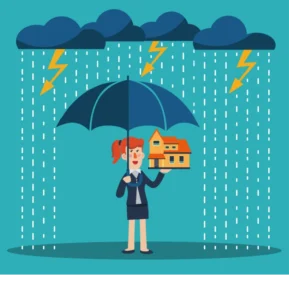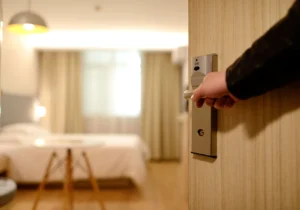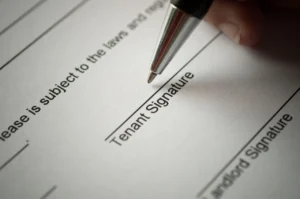What They Don’t Teach You About Evictions in Landlord School
 If you’ve ever had any training buying rental properties, investing in real estate or taken actual training on being a landlord, one area they often either gloss over or entirely skip is the part about evictions. It’s easy to understand why, it’s not a very glamorous topic and it’s right up there with fixing toilets at 3am in the excuses for not being a landlord handbook. Yet knowing the rules, and following some simple steps in advance, can often mean the difference between making an eviction quick and cost effective, versus drawn out and costly for you the landlord.
If you’ve ever had any training buying rental properties, investing in real estate or taken actual training on being a landlord, one area they often either gloss over or entirely skip is the part about evictions. It’s easy to understand why, it’s not a very glamorous topic and it’s right up there with fixing toilets at 3am in the excuses for not being a landlord handbook. Yet knowing the rules, and following some simple steps in advance, can often mean the difference between making an eviction quick and cost effective, versus drawn out and costly for you the landlord.
Unfortunately, I can’t help you with the rules. The problem being that rules for evictions are all over the map. Some areas allow a 3-day notice, some a 7-day and others 14. Some places have landlord tenant courts, others call them tribunals and others picked letters out of a hat to create unpronounceable acronyms for a service landlords can’t understand!
Then there’s the rabbit hole of what to do with all the tenants belongings if you successfully evict them. While I don’t know of any areas that allow celebratory bonfires, there are usually specific rules about what to do with items if they exceed certain value amounts, how to store them (if you are allowed to store them) and how to dispose of them.
None of which is important until that dreaded day you discover you have a problem tenant and suddenly discover yourself over loaded with “what ifs”.
- What if the tenant doesn’t pay?
- What if the tenant destroys my property?
- What if I can’t collect and much, much more.
Look, understanding your local rules should be one of the first things you learn, before you become a landlord, yet it’s often something we learn the hard way as we’re dealing with the additional stress of a problem tenant.
So let’s talk about what you can do to get up to speed, and why!
Lesson One – Leases
Probably the most important reason to understand the rules is to allow you to customize your leases so they help you work within the rules and give you the most power. Hold it, you do have a written lease don’t you?
Perhaps this is where I need to share some of my background.
I’ve been a landlord since the early 2000’s and I’ve had around 1,500 tenants during that time. Yes, 1,500 which is crazy when you see the number, but the positive is, it also has given me an over abundance of experience in evictions.
Maybe it’s just a sign of how crazy Real Estate folks can be, but I actually see the positive about this experience.
You see, I turned this experience into a benefit for other landlords as well as myself as I created a website for the area I’m in that walks landlords through the eviction process.
This has helped me see the same problems over and over and over and the biggest being no written lease, or a generic lease that allowed tenants to walk all over the landlord due to ambiguity or simply being too generic.
You need a written lease that allows you to enforce your rules within the local rules.
Whether this is making sure it contains a no smoking clause (where applicable), a no pets clause (again, where applicable) or specifics about what happens if they bounce a check, fail to pay, or skip out. Again, all worded and slanted to ensure you have the necessary power where needed.
So first lesson, if you don’t have a written lease, contact a local landlord association, a lawyer who specializes in Real Estate and rental issues or pick up some of the forms available here on AAOA.
Second Lesson – Evidence
The second problem landlords run into is not having enough hard evidence of a problem when it comes to an eviction.
As part of my eviction site, I also offer consulting services that walk landlords through the steps they need to successfully evict a tenant and as heart breaking as it can be sometimes I often end up telling landlords they won’t be able to get an eviction with the information they have.
I have to tell them that after months of stress and headaches, they’ll have to wait another month or two to have enough evidence to obtain the eviction they so desperately want and need.
And so begins lesson two!
Document, document, document!!!
If you don’t already have a tenant journal get one. It can be a simple notebook, an app on your smart phone, or some other method of recording interactions with your tenants. From the innocent call about a broken appliance to conversations about late payments you need to record it all in your journal along with dates and times.
These notes can become your timeline and your beginning pile of evidence. They can show a history of behavior from continuous late payments to a trail of lies and deceit. All which become incredibly handy in many hearings.
The extra benefit is you also come across as a professional landlord versus a run of the mill landlord which makes a huge difference in the eyes of a judge, hearing officer, tribunal or whomever you may face when evicting a tenant.
And any edge you can get is crucial, you’re dealing with a considerable investment when you own a rental property and you need to remember that.
One additional tip to include with this is to follow up any phone conversations with your tenants with written notice addressing what was talked about.
As an example of this, if your tenant calls explaining they need a couple extra days for rent and you agree to this, follow up with an email, a written notice dropped off at the place or both covering off what was discussed and any timelines agreed upon. And also document it in your tenant journal.
Third Lesson – Resolutions
The third lesson about evictions is to work with your tenant to resolve any issues, but make sure you have a line in the sand and an understanding of repercussions, your actions going forward and the end results.
This may involve providing extra leniency for a long standing tenant that has fallen behind, but with a firm understanding that you will take action if it continues.
Or it may require you to make decisions that while unsavory at the time are better long term for you. I’m not talking about breaking laws, shutting off utilities or removing front doors here either.
I’m talking about paying a tenant to leave, refunding full deposits even though tenants have left messes or not charging or going after any judgments in an effort to expedite getting control of your property back and having the problems go away.
You need to understand with evictions that your ultimate goal is to resolve the problem and get control of your property back. If it costs you $1,000 so your problem goes away and you can get a new paying tenant within a week or two it may well be worth it.
If you have to eat the cost of cleaning up after a tenant at your expense, but you have control of your property and they are gone, it may be worth it.
If you have to pay someone just to leave two weeks early, it could save you a month or two of lost rent on top of additional costs for repairs and hearings, so again it may be worth it.
Bottom line, you need to decide whether the short term pain of giving back a deposit, refunding a month’s rent or even paying someone to leave will save you weeks or months of additional headaches and expenses!
Just make sure if you do have to pay them, no money changes hands until they are out!!
Final Lesson – Learn Before You Have To
Finally, learn the local eviction systems before you need them.
Learning as you go can work for many different situations, but during the stress of an eviction, when your property that you worked hard for is potentially at risk of damages and destruction and when your bank account is spiraling downwards due to non-payment and unexpected costs, you’re probably not in the best position to blindly learn as you go…
If you have at least a basic understanding it can help pave the path moving forward and if you follow the first several lessons at least you will be more prepared if you do have to go down an eviction route.
The Ultimate Lesson Learned from Evictions
To really wrap this up, I need to share with you the most important lesson you need to know as a landlord. And unfortunately this is the lesson that gets reinforced after you’ve gone through your first eviction.
It’s far easier to let a bad tenant in, than it is to get a bad tenant out…
Think about that.
If you understand that and really let it sink in, it will change how you operate your landlord business.
It means you’ll put far more effort into screening your tenants, into not settling for someone just to get the burden of an upcoming mortgage payment off your back and into actually completing your due diligence properly.
I’m talking about checking all references, completing credit checks and verifying the tenants ID which are all parts of a solid tenant screening process. All steps to save you headaches down the road.
Yes, it’s definitely more upfront work, but as I mentioned skipping this can lead you right back to that Ultimate Lesson:
It’s far easier to let a bad tenant in, than it is to get a bad tenant out…
![]() Bill Biko – “The Educated Landlord” has been an active landlord for well over a decade and during that time has packed more enough experience in for dozens of regular landlords. From rooming houses, to rent to owns, furnished rentals and“regular”rentals, Bill has had around 1,500 tenants which has made him a master of systems and a master of evictions. To find out more about Bill or to get access to additional tips, articles and Bill’s “7 Questions Landlords Must Ask” visit www.TheEducatedLandlord.com
Bill Biko – “The Educated Landlord” has been an active landlord for well over a decade and during that time has packed more enough experience in for dozens of regular landlords. From rooming houses, to rent to owns, furnished rentals and“regular”rentals, Bill has had around 1,500 tenants which has made him a master of systems and a master of evictions. To find out more about Bill or to get access to additional tips, articles and Bill’s “7 Questions Landlords Must Ask” visit www.TheEducatedLandlord.com













 Accessibility
Accessibility